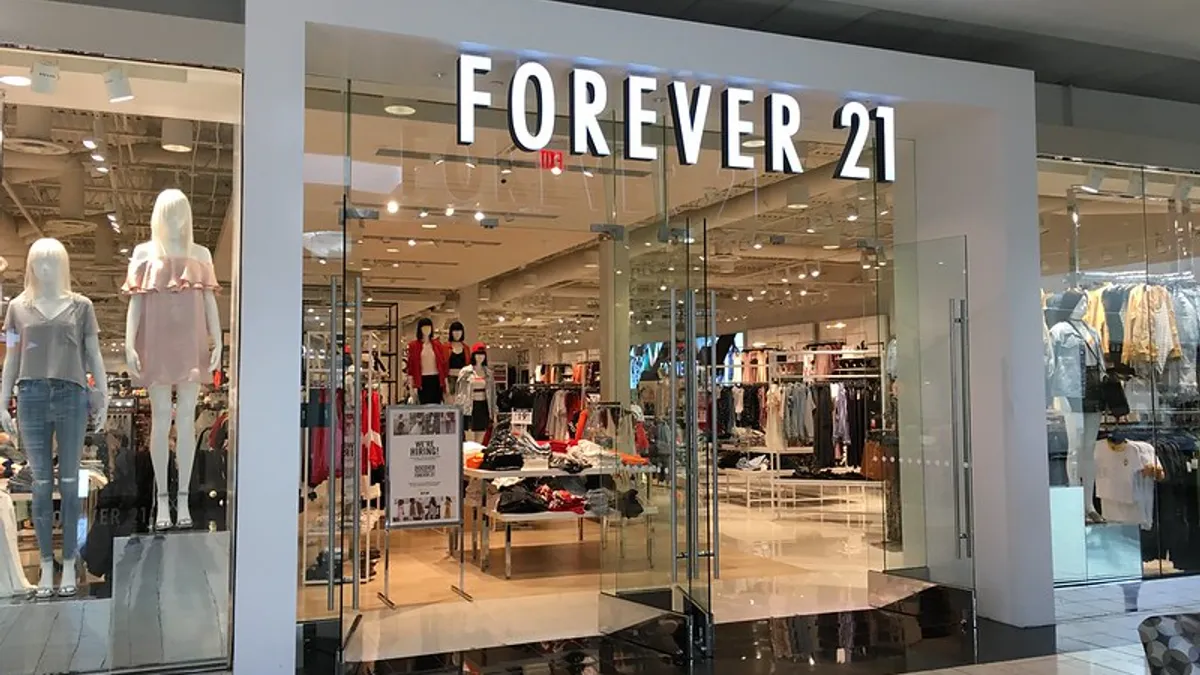UPDATE: June 19, 2019: Forever 21 has reportedly gone further in its efforts to avoid bankruptcy, according to the Wall Street Journal. The publication reported that the retailer has hired restructuring advisers, citing sources familiar with the matter. Latham & Watkins LLP is on board to help renegotiate leases that could involve shuttering stores, and Alvarez & Marsal was hired to overhaul operations, the Journal said. In addition to the rent relief, the fast-fashion retailer hopes to raise money, in part to replace a JPMorgan Chase loan it’s burned through to cover losses, according to the report. Forever21 didn’t immediately return Retail Dive’s request for comment.
Dive Brief:
-
Forever 21 is mulling its financial options amid a sales slump, including bankruptcy, and has reached out to private equity firm Apollo Global Management regarding a debtor-in-possession loan, Bloomberg reported on Monday.
-
Forever 21 didn’t return Retail Dive’s request for comment. The company told Bloomberg it "is speaking with our lenders in the normal course of business and are in compliance with all of our agreements and continue to operate as usual." A spokesperson for Apollo declined to comment to Retail Dive.
-
The companies have spoken to each other, however, a source familiar with the discussions told Retail Dive in an interview. The retailer reached out to Apollo, but there is no completed plan or any deal actively happening, according to the source.
Dive Insight:
As a private company, Forever 21 doesn't have to report its finances. Struggles at the retailer were in evidence earlier this year, however, when it shut down its Chinese e-commerce site, months after also closing stores in Taiwan and France.
But its problems may be closer to home as well. The fast-fashion retailer expanded in recent years, reportedly investing in Los Angeles-based apparel subscription service DailyLook last year, launching beauty brand Riley Rose with its own freestanding stores the year before that, and in 2014 doubling down on its razor-thin prices with the launch of its super-cheap "F21 Red" banner.
Its model — based on trend knock-offs made swiftly and cheaply — has faltered of late, however. With the Great Recession in the rearview blunting the need for such low prices, an acceleration of luxury labels' supply chains and a focus on sustainability, consumers have looked askance at a fast, cheap production approach. While rivals H&M and Inditex responded with some higher-quality and eco-friendly offers and made pledges around more ethical sourcing and production, Forever 21 has done comparatively little.
The Los Angeles-based company is looking not only to bolster its financial position, but also do so in a way that allows the founding family to maintain control, according to Bloomberg's report. Its headquarters earlier this year sold for about $166 million, according to the Los Angeles Business Journal.
Founded in 1984, the company runs more than 815 stores in 57 countries, according to a company press release.
















